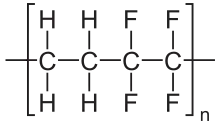 | |
| Names | |
|---|---|
| IUPAC name
poly(1,1,2,2-tetrafluorobutane-1,4-diyl) | |
| Other names
poly(ethene-co-tetrafluoroethene) | |
| Identifiers | |
| ChemSpider |
|
CompTox Dashboard (EPA) |
|
| |
Except where otherwise noted, data are given for materials in their standard state (at 25 °C [77 °F], 100 kPa).
Infobox references | |
Ethylene tetrafluoroethylene (ETFE) is a fluorine-based plastic It was designed to have high corrosion resistance and strength over a wide temperature range. ETFE is a polymer and its source-based name is poly(ethene-co-tetrafluoroethene). It is also known under the DuPont brand name Tefzel and is sometimes referred to as 'Teflon Film'. ETFE has a relatively high melting temperature and excellent chemical, electrical and high-energy radiation resistance properties.
Properties
Useful comparison tables of PTFE against FEP, PFA and ETFE can be found on DuPont's website, listing the mechanical, thermal, chemical and electrical properties of each, side by side.[1] ETFE is effectively the high-strength version of the other three in this group.
ETFE film is self-cleaning (due to its nonstick properties) and recyclable.[2] As a film for roofing it can be stretched and still be taut if some variation in size, such as that caused by thermal expansion, were to occur. Employing heat welding, tears can be repaired with a patch or multiple sheets assembled into larger panels.
ETFE has an approximate tensile strength of 42 MPa (6100 psi), with a working temperature range of 89 K to 423 K (−185 °C to +150 °C or −300 °F to +300 °F).[3]
ETFE resins are agnostic to ultraviolet light. An artificial weathering test (comparable to 30 years’ exposure) produced no filtering and almost no signs of film deterioration.[4]
ETFE systems can control light transmission through the application of plasma coatings, varnishes or printed frit patterns.[5] Thermal and acoustic insulation can be incorporated into an ETFE structure via the use of multi-layer systems which use low-pressure air pumps to create ETFE "cushions".[6] For instance u value of ETFE single layer, double and three layers are approximately: 5.6, 2.5 and 1.9 W/m2.k respectively[7] while concerning g value of etfe cushion or SHGC in ETFE systems it can vary between 0.2 to 0.95 using frits[5] and for further info about SHGC in ETFE refer to[8]
Applications
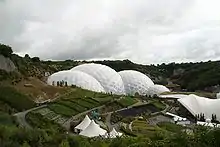
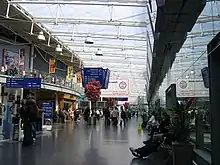
ETFE was developed by DuPont in the 1970s initially as a lightweight, heat resistant film in the aerospace industry.[9] From its development it was largely used infrequently in agricultural and architectural projects.[9] ETFE's first large-scale use architecturally came in 2001 at the Eden Project where ETFE was selected as it can be printed and layered to control solar conditions and because it was found to have a low friction coefficient, which saves on maintenance as dust and dirt do not stick.[9]
An example of its use is as pneumatic panels to cover the outside of the football stadium Allianz Arena or the Beijing National Aquatics Centre (a.k.a. the Water Cube of the 2008 Olympics) – the world's largest structure made of ETFE film (laminate). The panels of the Eden Project are also made from ETFE, and the Tropical Islands have a 20,000 m2 window made from this translucent material.
Another key use of ETFE is for the covering of electrical and fiber-optic wiring used in high-stress, low-fume-toxicity and high-reliability situations. Aircraft, spacecraft and motorsport wiring are primary examples. Some small cross-section wires like the wire used for the wire-wrap technique are coated with ETFE.
As a dual laminate, ETFE can be bonded with FRP as a thermoplastic liner and used in pipes, tanks, and vessels for additional corrosion protection.
ETFE is commonly used in the nuclear industry for tie or cable wraps and in the aviation and aerospace industries for wire coatings. This is because ETFE has better mechanical toughness than PTFE. In addition, ETFE exhibits a high-energy radiation resistance and can withstand moderately high temperatures for a long period. Commercially deployed brand names of ETFE include Tefzel by DuPont, Fluon by Asahi Glass Company, Neoflon ETFE by Daikin, and Texlon by Vector Foiltec. Additionally, now a day the commercial use of architectural ETFE as skylight or facade materials has become very popular all over the world not only in Europe, in middle east for instance many shopping malls, sports and cultural mega venues developments has utilized ETFE for example recent huge greenhouse park development in Abu Dhabi (Mawasem Park - Green House - Abu Dhabi House) managed by Fabrix360 ETFE expert[10]
Due to its high temperature resistance ETFE is also used in film mode as a mold-release film.[11] ETFE film offered by Guarniflon or Airtech International and Honeywell is used in aerospace applications such as carbon fiber pre-preg curing as a release film for molds or hot high-pressure plates.

Notable buildings
Notable buildings and designs using ETFE as a significant architectural element:
- Allianz Arena, Munich, Germany
- Beijing National Aquatics Centre, (the Water Cube) Beijing, China
- Eden Project, Cornwall, United Kingdom
- Khan Shatyr Entertainment Center, Nur-Sultan, Kazakhstan

- National Space Centre, Leicester, United Kingdom
- Cuauhtémoc Stadium, Puebla, México.
- Midland Metropolitan University Hospital, Smethwick, Birmingham, United Kingdom
- U.S. Bank Stadium, Minneapolis, Minnesota, United States[9]
- SoFi Stadium. Inglewood, California, USA[12]
- Allegiant Stadium, Las Vegas, Nevada, USA.
- Hard Rock Stadium, Miami Gardens, Florida, United States
- Banc of California Stadium. Los Angeles, California, United States[13]
- Avenues Phase-III, Al-Rai, Kuwait
- Avenues Phase IV & IVB, Al-Rai, Kuwait
- Dworzec Tramwajowy Centrum, tram station in Łódź, Poland.
- Solaris, Clamart, France
- Discovery College, Lantau Island, Hong Kong
- Green 18, Hong Kong Science Park, Hong Kong
- Pavilion, Alnwick Castle, Alnwick, United Kingdom
- BC Place, Vancouver, British Columbia, Canada,[14]
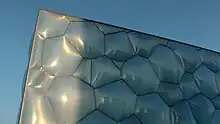
- River Culture Pavillon The ARC, Daegu, South Korea
- Munich's municipal waste management department, Munich, Germany (2011)
- Beijing National Stadium, Beijing, China
- FestiveWalk, Resorts World at Sentosa, Singapore
- Dolce Vita Tejo Shopping Centre, Amadora, Lisbon, Portugal
- roof, dedicated underground rail station at the Heathrow Airport Terminal 5, London, United Kingdom
- Manchester Victoria station concourse, Manchester, United Kingdom
- Forsyth Barr Stadium at University Plaza, Dunedin, New Zealand
- Islazul Shopping Centre, Madrid, Spain
- Kansas City Power & Light District, Kansas City, Missouri, United States
- South Campus skylight structures, Art Center College of Design, Pasadena, California, United States
- Tanaka Business School, London, United Kingdom
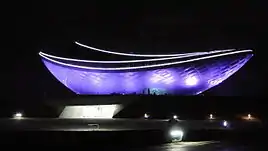 ETFE Facade with integrated LED Lights
ETFE Facade with integrated LED Lights - The Shed (Hudson Yards). Manhattan, New York, USA
- Tropical Islands, Brandenburg, Germany
- Barnsley Interchange, Barnsley, United Kingdom
- The Mall Athens, Athens, Greece
- Newport railway station, Newport, United Kingdom
- The Elements, Livingston, United Kingdom
- Experimental Media and Performing Arts Center, Rensselaer Polytechnic Institute, Troy, New York, United States
- Arena Pernambuco, Recife, Brazil
- Sandton City, Sandton, South Africa
- Key West Shopping Centre, Krugersdorp, South Africa
- Oceanus Casino, Macau, Special Administrative Region of China.
- Masdar City, Abu Dhabi United Arab Emirates
- ISS Building, Lancaster University
- Empire City Casino, Yonkers, New York,[15] United States
- Institute of Technical Education, Singapore (2012)
- The SSE Hydro, Glasgow, Scotland
- Anaheim Regional Transportation Intermodal Center, California[16] (12-13-14)
- National Stadium, Singapore
- Orto Botanico di Padova Biodiversity Garden roof, Padua, Italy
- Guangzhou South Railway Station, China
- Yujiapu Railway Station, China
- Persian Garden, Iran Mall, Tehran, Iran
- Anoeta Stadium, San Sebastian, Spain
- Ed Kaplan Family Institute for Innovation and Tech Entrepreneurship, Illinois Institute of Technology, Chicago, Illinois
- Mercedes-Benz Stadium, Atlanta, Georgia (2017)[17]
- US Embassy ETFE Facade, London, UK (2017)
- Tron Lightcycle Power Run, Shanghai Disneyland, China (2017) [18]
- UQ Global Change Institute Living Building, Brisbane, Australia (2013)[19]
- Lakhta Center, St. Petersburg, Russia (2019)

- Haneda Airport Terminal 2, International Flight Facilities, Tokyo, Japan (2020)
- Macquarie University Arts Precinct ETFE Roof, Sydney, Australia (2020)
- Hayward Field, University of Oregon, Eugene, Oregon (2020)[20]
- Rhodes Central Commercial Development, Sydney, Australia (2021)
- Mawasem Park - Green House - Abu Dhabi (2022)
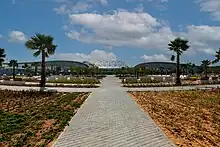 Mawasem Park Abu Dhabi
Mawasem Park Abu Dhabi
Under construction
- Jungle Exhibit, Sedgwick County Zoo, Wichita, Kansas (2015),[21] United States
- West End Stadium, Cincinnati, Ohio, USA
- Dockside Pavilion, Sydney, Australia (2014)
- Baku Olympic Stadium, Baku, Azerbaijan (2015)
- Australian Embassy, Jakarta, Indonesia (2014)
- Wharf Retail, Bluewaters Island, Dubai[22] (2016)
- Carlisle Railway Station, Carlisle, Cumbria (2017)
- Oxigeno, San Francisco, Heredia Province, Costa Rica
- Jakarta International Stadium, Jakarta, Indonesia
- Primark Birmingham, UK
- Boston Logan Airport (terminal E), Boston, Massachusetts (2021-2022) [23]
- Tron Lightcycle Power Run, Walt Disney World, US (2022) [24]
References
- ↑ "Fluoropolymer Comparison - Typical Properties DuPont". Archived from the original on November 16, 2018.
- ↑ "ETFE". Archived from the original on 2013-03-09. Retrieved 2008-02-06.
- ↑ "Boedeker Plastics, Inc. > Product". www.boedeker.com.
- ↑ "ETFE". FlexFacades by Structurflex. Retrieved 2019-10-09.
- 1 2 Fabrix360 (2022-01-29). "How ETFE printing and adhesion durability lasts?". home. Retrieved 2023-12-12.
{{cite web}}: CS1 maint: numeric names: authors list (link) - ↑ "10 Benefits of Using ETFE Foil In Architecture".
- ↑ Fabrix360 (2020-04-01). "U-value ETFE cushion, the rout to precise determination". home. Retrieved 2023-12-12.
{{cite web}}: CS1 maint: numeric names: authors list (link) - ↑ Fabrix360 (2022-04-24). "What is ETFE G-value (Solar Heat Gain Coefficient SHGC)". home. Retrieved 2023-12-12.
{{cite web}}: CS1 maint: numeric names: authors list (link) - 1 2 3 4 Lynch, Patrick (2019-04-06). "What is ETFE and Why Has it Become Architecture's Favorite Polymer?". ArchDaily. Retrieved 18 June 2021.
- ↑ "Projects | Fabrix360 | United Arab Emirates". home. Retrieved 2023-12-10.
- ↑ Fabrix360 (2021-12-05). "ETFE durability makes you worry!". home. Retrieved 2023-12-12.
{{cite web}}: CS1 maint: numeric names: authors list (link) - ↑ "LASED – LA Stadium & Entertainment District at Hollywood Park".
- ↑ "Banc of California Stadium Facts | Los Angeles Football Club". Archived from the original on 2017-12-13. Retrieved 2017-12-26.
- ↑ "The Northern Lights Display". BC Place.
- ↑ Stoelker, Tom (17 August 2012). "STUDIO V Bets on a Curving Lattice Porte-Cochere in Yonkers". Archpaper.com. Architect’s Newspaper. Archived from the original on 2 February 2014. Retrieved 19 January 2014.
- ↑ "ARTIC | Life's a Journey Celebrate the Ride". Archived from the original on 2014-10-23. Retrieved 2014-10-22.
- ↑ Tim Tucker, The Atlanta Journal-Constitution. "LEADOFF: What's next for Mercedes-Benz Stadium roof?". The Atlanta Journal-Constitution.
- ↑ "Grimshaw completes roller coaster attraction at shanghai disney resort's tomorrowland". 21 November 2017.
- ↑ "The Global Change Institute - The University of Queensland, Australia". gci.uq.edu.au.
- ↑ "A ONE OF A KIND ETFE FACADE".
- ↑ Gruver, Deb (20 August 2014). "New roof will help save jungle exhibit at Sedgwick County Zoo". Wichita Eagle. Retrieved 20 August 2014.
- ↑ "BNC Network - The region's largest construction intelligence platform".
- ↑ "Terminal C Canopy and Upper Deck". Retrieved 5 August 2021.
- ↑ "Latest look at the ETFE cushion canopy installation at TRON Lightcycle Run in Magic Kingdom".
External links
- ETFE Resins - Chemours Teflon